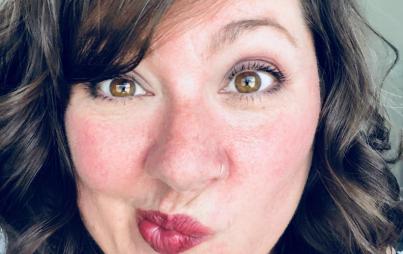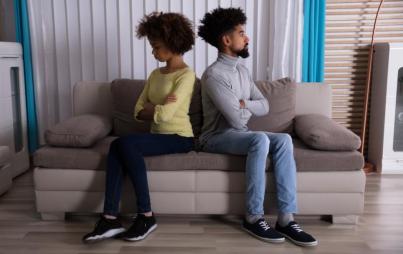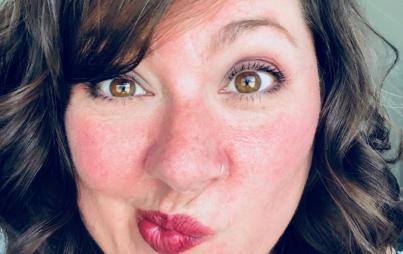
If I wanted to start being vulnerable with the people I love again, I needed to figure out when my avoidance began and why.
Long Reads is a bimonthly feature, showcasing long-form essays.
The first time I had difficulty with vulnerability was after my mom died. I remember looking through a manila envelope filled with cards from kids in the neighborhood, and among them was a hand-drawn card from one of my friends who wrote, “I’m sorry about your mom. I hope you can still live here, with your nana or something.”
She really doesn’t get it, I thought. I felt my eyes starting to water.
The weeks and months following my mom’s death were a stark contrast from what I knew: People couldn’t always relate to what was going on with me. They didn’t know how to react to my emotions. They often said the wrong thing. At least when I’d come out as queer to a few people when I was ten, I knew other people who were questioning their sexuality. I had a homeroom teacher who was transgender.
I wasn’t the only LGBTQ+ person I knew, but I felt like the only middle schooler in the entire world with a dead parent.
Despite my fears of vulnerability, some part of me knew it was the key to having fulfilling intimate relationships, as Dr. Brené Brown, a researcher of human connection, discusses in her TEDx Houston talk "The Power of Vulnerability" and her book Daring Greatly: How the Courage to Be Vulnerable Transforms the Way We Live, Love, Parent, and Lead. I wanted the kind of friendships that keep you up all night talking — whether in a blanket fort or from the top bunk or sitting around the table in a college dorm common room — about everything and anything. I wanted friends who I could call in a moment if something like my mom’s death ever happened again, and who knew they could call me too. Even at three in the morning. As my mom always used to write in her letters, “Call me anytime, collect,” because it was the nineties.
My mom had always nurtured my natural predisposition for being fully myself, which included being open about my flaws, fears, hopes, and deepest sadnesses. We had emotional talks when I got home from school, and when I was eleven and my aunt died on my birthday, it was my mom who encouraged me to tackle the complicated process of grieving someone who I didn’t have a good relationship with. My dad took over this role after my mom died, and he did it fabulously, sitting me down for weekly “therapy” sessions where he’d check in with me about school, friends, and how I was handling my mom’s death. I was so comfortable being honest that even coming out to my dad when I was thirteen felt natural against the backdrop of my slight anxiety that he wouldn’t accept me.
♦♦♦
Until right around the time of my college graduation, my fears about vulnerability were limited. It was more difficult at times than others — it took me six months to tell anyone, including my long-term girlfriend, that I had been raped at a campus party — but I always worked my way through the uncertainty and unease of opening up to others because it felt freeing to be on the other side. It's liberating to be honest, to risk showing every part of myself to someone else and have them love me unconditionally. It helped me love myself unconditionally and express myself boldly, earning me nicknames throughout the years like the Tutu Girl and the Girl with the Purple Hair.
If I didn’t talk about the incident, I thought it might disappear and my fears would weaken just like they had when I shared them.
For the entirety of my senior year of college, I was more vulnerable than usual with my close friends. I’m an ENFP, so I’ve never been the kind of person who absolutely has to work through a problem by discussing it with someone else; it’s more of a choice about who I trust and who can best help me in a situation, or who is a better listener.
All year, I’d build blanket forts in our apartment living room on random weeknights and tell my roommates and friends to sit in them with me and just talk about our fears.
Would we get jobs after college? Would we be accepted into the various graduate programs some of us were applying to? Would our romantic relationships last, or if we weren’t in one, would we find one after graduating? I told my friends every fear I had (that I wouldn’t get a job and would wind up homeless because I knew my dad was on the brink of eviction, or that I’d be accepted into a graduate program but not be able to afford to go like I’d done with the private schools I turned down for undergrad) and the fears felt lighter after I shared them with someone else, like they didn’t have so much power over me.
It wasn’t until midway through my final semester that I found out my dad’s financial and medical situation was more complicated than I thought. He had unpaid court debts that threatened to send him to prison if he didn’t pay them on time (on time actually meant “right now”); he got final word from the bank that seized his landlord’s house that all tenants were being evicted within ninety days, and he was having trouble working his job as a night shift cab driver because of a traumatic brain injury and other worsening health issues.
On the night that we were driving to celebrate my birthday with dinner at a sushi restaurant during my last college spring break, I spotted flashing police lights in the rearview mirror out of the corner of my eye. My dad got out of the driver’s seat and I produced a current license of my own so the officer would let me get behind the wheel after he took my dad to the state police office a few highway exits away. “Are you okay to drive?” he asked before he left me sitting in my dad’s green 1998 Buick century, the car I learned to drive on and had gotten a flat tire in during a snowstorm at college. “I’m fine,” I said, adjusting my mirrors and the clunky seat. With shaking hands, I picked my dad up from the station and posted his bail, fortunately under two hundred dollars.
When I got back to school after break, I didn't tell anyone about what had happened.
How could I, when my friends were worrying about finals and graduate school applications and whether or not to marry their college boyfriends? If I didn’t talk about the incident, I thought it might disappear and my fears would weaken just like they had when I shared them. Didn’t it work in reverse? If I didn’t name what happened, I wouldn’t give it power.
A few days after spring break ended and the day before my birthday, I opened my email to a congratulatory letter telling me I had been accepted into my top-choice graduate program at Emerson College in Boston with a scholarship. It felt like the universe was giving me a sign: Things would be okay. I wouldn’t be homeless. I had somewhere to go after college. I blinked my memories of the flashing police lights out of my head and pretended my worries about the future were nothing unusual for a college senior.
♦♦♦
A few weeks ago, I was hanging out with a friend one-on-one. She and I were talking a lot about third-party topics (the kind of safe things you can say to someone you don’t know that well, except we know each other so we can also bring up politics and religion) when the conversation turned to how she was doing. I was happy to offer a listening ear about her recent problems at work, but part of me was hoping she wouldn’t ask me how I was doing in return. I had my answers ready in the back of my mind in case anyone asked; they were rehearsed. My career? I had a sentence or two for that. My family? I had that covered, too. How was I doing, as vague a question as that always feels? My answer was just above “I’m fine, thanks, and you?” but it was quirky enough that it still sounded like something I would say.
I didn’t realize how rehearsed my responses until she finally asked some version of what was up with me. Even as vulnerable as I usually am, it’s a question I’ve always hated, preferring to have my emotions and stories come up naturally in conversation instead of looking up to see a spotlight hanging over me and a mic in my hand: It’s officially your turn to catch me up on your life. These questions always made me feel like I was a tube of toothpaste and I had to squeeze out everything that was going on all at once. Luckily, I had my quirky throwaway “I’m fine, thanks,” prepared, and we switched topics almost immediately.
This wasn’t the first time I’d been dishonest — or at least far less than truthful — with a friend. In the past two years, I can name more friends who don’t know the small corners of my fears and dreams than friends who do.
I have directly avoided every conversation I have that’s actually about my life, and I have a long list of interesting third-party topics packed into a conversational machine gun in case someone turns to me when I’m unprepared and asks, “So, how’s your dad?” (How’s my dad? Have I told you that I saw Michelle Obama speak earlier this month? Did we talk about impending nuclear war yet? Did I show you that article that thoughtfully dissects the life and death of Hugh Hefner? What are your opinions on universal healthcare? Are you familiar with the twenty-three hours that Handbook for Mortals spent on the New York Times bestseller list? These were all topics I’d rather bring up than anything personal about me at all.)
Research shows that people love talking about themselves, and my problem wasn’t that I couldn’t talk about myself. If my friends were discussing their opinions about universal healthcare, I was capable of weighing in easily. When we talked about our favorite childhood movies, or even our most embarrassing memories, I had no difficulty sharing.
But if the subject put me in a vulnerable position, if I felt it carried some emotional risk, I went out of my way to avoid it the way I pick onions out of a salad.
I know from research and statistics how important vulnerability is to every corner of our lives, from our interpersonal relationships to our careers and our creativity. Every time I choose not to be vulnerable in the moment, I’m not allowing the opportunity for risk or personal growth. I’m not only shutting down the negative emotions that I fear, but the positive ones, like love, creativity, trust, and joy. There are even times with my partner of over eight years, who knows more of my flaws than anyone else and still loves me, that I’ve held back from admitting weakness or talking about something difficult.
If I wanted to start being vulnerable with the people I love again, I needed to figure out when my avoidance began and why.
♦♦♦
Brené Brown basically defines vulnerability as “uncertainty, risk, and emotional exposure.” I recognize it in myself whenever I’m holding back in a situation.
Not choosing to be vulnerable looks like this:
My best friend told me about what it’s like to take care of her mom, who recently survived cancer. She talked about the little things — helping her mom drive to doctor’s appointments because she can’t drive herself, assisting her in getting around the house, forgoing vacations because her mom wouldn’t be able to physically make it.
We can choose to connect with the difficult pieces of someone else’s story — or we can numb those feelings within ourselves. Our response, whether it’s to make a joke or offer platitudes or try to fix the situation, masks our real emotional reaction.
After I listened, I thought about how I could relate to her, what pieces of my life made me feel I could say, “I see where you are now, and I’ve been there too.” That’s how Brown describes empathy. I could have talked about my dad, who was diagnosed with a traumatic brain injury, and how I’ve helped him with the process of applying for social security or visiting him in the hospital after his suicide attempt, and how small he looked in a gown under those fluorescent lights.
But shame stepped in and I didn’t talk about my own feelings. I didn’t say, “Me too.”
I witnessed what she was dealing with and admitted it was hard and she could talk to me, but I didn’t foster real connection because I didn’t put any of my own vulnerability on the line.
When people talk about difficult topics — or as my cousin Nicole and I like to call them, Level 3 Conversations — we’re not always sure how to respond. There’s a likelihood that we won’t have experienced exactly what the person is discussing, whether it’s having two recent abortions, losing a parent young, learning about a disability diagnosis, or coming out as transgender. But there is this immense opportunity to find a way within ourselves to connect with whatever emotion that person is feeling — but too often, we back away.
You Might Also Like: I'll Show You Mine If You'll Show Me Yours: Vulnerability
Backing away looks like: Offering unsolicited advice, trying to make things better, making light of the situation, looking for a silver lining, offering platitudes, saying “I’m sorry for your loss” and nothing else, comparing the person’s situation to our own or someone else’s to make it seem smaller, finding something positive about the person’s life to bring up.
Backing away is what happens when I want to talk about my disability, Ehlers-Danlos Syndrome, and how awkward I feel sometimes in public when passersby stare at my lavender cane. Or how tough it is for me when I’m walking up a set of stairs clutching the handrail, and someone coming in the opposite direction never moves, and we meet in the middle at a standstill. Backing away is the moment when someone hears that story and instead of offering genuine empathy, says: “Have you tried yoga? How often do you go to physical therapy? Do you actually need a cane or can you walk just fine? How often do you consume nothing at all besides kale?”
We can choose to connect with the difficult pieces of someone else’s story — or we can numb those feelings within ourselves. Our response, whether it’s to make a joke or offer platitudes or try to fix the situation, masks our real emotional reaction.
♦♦♦
Choosing not to be vulnerable doesn’t just hurt us in moments of sadness, fear, and shame. I still remember that day I found out I got into my top-choice graduate school program. I rushed out into the kitchen, where my roommate and one of my best friends, Krista, was making lunch.
“I got into Emerson!” I said, quietly but with as much pizzazz as I could muster knowing someone else in our apartment was taking an after class nap. She and I both jumped into the air, screaming under our breath for a few minutes.
That’s what it looks like to share vulnerability in moments of joy.
Vulnerability happens in love, whether it’s romantic love or friendship; it’s when you ask a friend to spend the anniversary of your mother’s death with you or when you call someone at two in the morning because you’re sad and you need to talk.
My reluctance to talk about work has nothing to do with trying to escape the grind when I’m not at my desk. I’m afraid that if I gush too much, or even live in a moment of joy about my career or work, it will crumble.
In the past year or so, I’ve stopped talking about my career and what I do for work. When I was still in undergrad, I used to talk about my dreams and what I wanted to do all the time. A few weeks ago, I even made a joke at a family barbecue to my cousin’s friend about how, “No one wants to talk about work when they aren’t at work.” While that’s true to a certain extent, it was just a mask.
My cousin’s friend said, “Actually, I love talking about my job because I love it.”
I looked away, feeling awkward. I love my job and I’m proud of it — I spent two years in a master’s degree program hoping to work in publishing and now I do. My reluctance to talk about work has nothing to do with trying to escape the grind when I’m not at my desk. I’m afraid that if I gush too much, or even live in a moment of joy about my career or work, it will crumble. If I tell people I love my job, I’ll lose it somehow. This is a pretty common fear for many marginalized people and trauma survivors, so it makes sense.
I could be vulnerable in those moments, and admit: “I love what I do, but I’m terrified of losing it. I’m afraid this was a stroke of good luck and I’ll be discovered as a fraud. I have pretty bad imposter syndrome. I’m actually a little scared that if I let myself feel joy about my career, I’ll lose my job, not be able to get another one because I’m not talented, and become homeless.”
Making jokes and relentlessly changing the subject away from my career are how I choose to back away from vulnerability and, as a result, connection.
♦♦♦
My real difficulty with vulnerability—not just finding it difficult, but actively avoiding it and even feeling anxious at the possibility of emotional exposure and risk — started right around the time I graduated from college.
While it was originally sparked by unusual life circumstances I felt other people couldn’t understand, part of the reason I’m struggling to dive headfirst back into vulnerability is because I’m afraid.
I’m an adult, and for whatever reason, most people see me as a successful one. Because I had no other choice, I worked hard and got an apartment just two months out of undergrad. I got my master’s degree. I juggled internships, working full-time, and freelancing while I was in school. I work in the field I got my education in, and have lived with my partner and our two cats for two years now. To every outsider, I look polished and (to use a word I loathe) successful.
I’m going to tell my friends how much I love them. I’m going to ask them to spend time with me during the holidays, and be honest about how much it means to me to have them with me for my twenty-fifth birthday.
Adult vulnerability feels riskier somehow than it did before. The stakes are higher. If I make a mistake, trust the wrong person, open up too soon, I’m afraid of the consequences of my risk. I think about how people’s judgments about my disability could keep me from employment in the future. I worry about being my authentic self with coworkers and being unfairly judged. I think about admitting my flaws to my friends and worry that they’ll disappear and I may never make any more.
Not being vulnerable in the last few years has left me more exposed than being authentic, honest, and wholehearted ever did, though. I’m making a commitment to being radically more vulnerable in every way—in my work, in my art and creative passions, in my relationships, and even with myself. I’m not going to stop myself when I feel tears coming on during a rewatch of Marley & Me (true story) because I don’t want my girlfriend of over eight years to see me cry. I’m not going to bring up political upheaval just to avoid talking about why I love my career and how afraid I am to lose it. I’m not going to sanitize my fears about my dad’s health, or my own disability.
When I was authentic and wholehearted, I was putting my full self out there — warts and all — but I was thriving.
My friends knew the real me and our relationships were strong because I knew we’d be there for each other when we needed to be. I felt like I could call someone on the phone and say, “Someone I love tried to die today,” and we would talk about it. There was risk, but there was so much joy that it was worth it.
I’m going to tell my friends how much I love them. I’m going to ask them to spend time with me during the holidays, and be honest about how much it means to me to have them with me for my twenty-fifth birthday. I’m going to ask them to take pictures together and I’ll put those up on my wall. I’ll tell people how excited I am when I publish something, unlike when I told pretty much no one that I had a piece in the New York Times in July. I’ll talk about work — and my fears about it, too. I’ll say that sometimes I work in bed in my pajamas because I’m in so much pain from my disability, and that there are nights when I want to write fiction but I can’t because my body feels like a live wire. I’ll talk about my hang-ups around money as a formerly poor person, even though talking about poverty feels like I’m inviting it back into my life.








